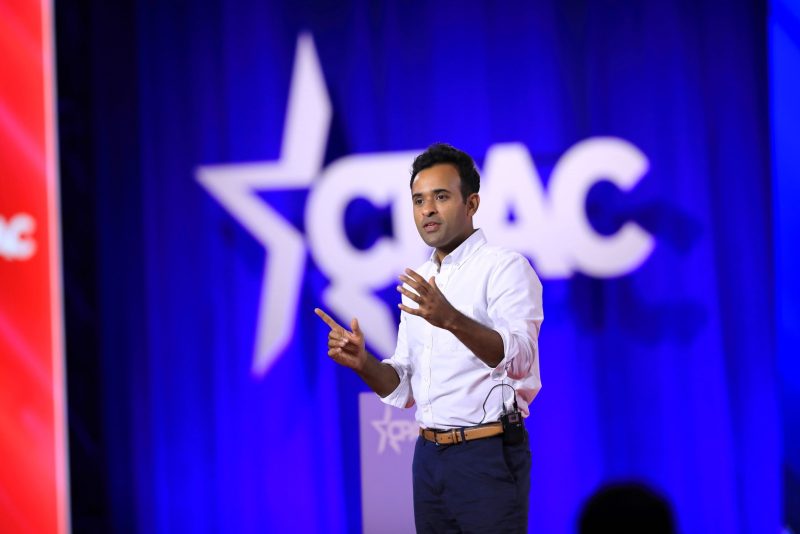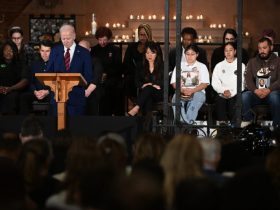Whatever special light it is that differentiates serious from nonserious presidential candidates, it shone on Vivek Ramaswamy this week.
The entrepreneur-slash-culture-warrior formally announced his presidential bid, joining former president Donald Trump and former U.N. ambassador Nikki Haley as contenders for the Republican Party’s 2024 presidential nomination. Former Cranston, R.I., mayor Steve Laffey announced his this month, but no one seems to have paid attention. That special light, it is fickle.
While not well-known, Ramaswamy is certainly better-known than Laffey. He’s spoken at the Conservative Political Action Committee, an important stop for those hoping to parlay criticism of left-wing politics into political popularity. It’s still exceedingly unlikely that he and Laffey will combine for more than, say, 2 percent of the primary vote.
That said, his launch strategy was sound: leverage the right’s favorite Rev. Martin Luther King Jr. quote in the right’s favorite way to leverage it.
We are at the tail-end of Black History Month, so coupling a February campaign launch with an invocation of the civil rights leader is not unexpected. But Ramaswamy, like so many before him, used King’s words from the 1963 March on Washington not to explore how racial divides still split the country, but instead to suggest that all of that is behind us.
We’re in the middle of a national identity crisis. Faith, patriotism & hard work have disappeared. Wokeism, climatism & gender ideology have replaced them. We hunger for purpose yet cannot answer what it means to be an American. We long for that answer. That’s why I’m running for… https://t.co/eDC1r4n6mG pic.twitter.com/aado2DzvNu
— Vivek Ramaswamy (@VivekGRamaswamy) February 22, 2023
“I remember in 1993 when I was in second grade and I heard Martin Luther King’s ‘I Have a Dream’ speech for the first time,” he says in a video he shared this week. “That was the speech where he said, ‘I hope my four children grow up in a country where they are judged not on the color of their skin, but on the content of their character.’”
“That dream stuck with me,” he said. “It meant something to me.”
So what does Ramaswamy take away from that quote? That we should focus on character, not skin color, as King wanted. That the incessant focus on racial identity politics he perceives from the left is a betrayal of that dream and the accomplishment it marks.
This is not a novel interpretation, certainly. Particularly since the 2008 election of President Barack Obama, after which point it became fairly commonplace to describe the country as “post-racial,” there’s been a refrain from right-wing and Republican voices insisting that the proper approach to race has been to get to the “content of their character” bit. This is useful, given that it both frames discussions about race as archaic and contrary to King’s wishes and allows criticism of racial rhetoric to be waved away, given the speaker’s avowed, colorblind focus on character.
This preferred framing was supercharged by the Black Lives Matter movement. Calls for uprooting systemic manifestations of racism, particularly within law enforcement, were dismissed: Hey, we’re beyond all that! In part, this is a reflection of a broadly naive understanding of how racial disparities can still exist. In King’s speech, he railed against the way “our children are stripped of their selfhood and robbed of their dignity by signs stating ‘for whites only.’” Such signs are now relegated to museums, it was suggested, along with the racism they reflected.
But in that same section, King articulated other barriers Black Americans faced, the obstacles he was dreaming about surmounting. Things like the way that “the Negro’s basic mobility is from a smaller ghetto to a larger one” — that is, that economic opportunity for Black Americans was limited. Or how “the Negro is the victim of the unspeakable horrors of police brutality.”
King’s dream was of a future that he hoped was possible. Ramaswamy and others on the right have declared it achieved on the good reverend’s behalf.
Republicans often really do believe this is the case. In YouGov polling conducted in December, only about half of Republicans said they believed Blacks faced “a great deal” or “moderate” discrimination — less than the percentage of Republicans who said the same of Christians or White Americans. Among Americans overall, more than two-thirds of respondents said they thought Blacks faced that level of discrimination.
Research published in 2019 found that Black and Hispanic Americans were several times more likely to report facing discrimination than Whites. Among Black Americans, the largest difference from Whites was in being unfairly treated by police. Among Hispanic Americans, it was in trying to rent or buy a house.
That’s a measure of individual perception, certainly, and may not reflect actual differences in experience between members of different races. There’s little prima facie reason to think that Black Americans don’t face such discrimination, but it is in fact subjective.
So let’s consider other research. The Washington Post’s database of police shootings establishes that Black Americans are more than twice as likely to be shot and killed by police, an obvious racial disparity. The standard response to this bit of data is that this is a reflection not of race but of levels of crime, which overlaps with poverty. It is true that Black Americans have lower income and less wealth than White Americans, certainly. But this gets back to King’s desired changes: that Black Americans would enjoy economic mobility.
That is hampered by racial discrimination. Black Americans are much more likely to be rejected for a home loan, for example, and have more difficulty in accessing banking services than Whites. If the immediate reaction to this is that it, too, reflects economic status and not race, consider this: Black Americans are demonstrably disadvantaged when seeking jobs. Research has repeatedly shown that employers are less likely to select a candidate for a job interview who has a distinctively Black name, even if that candidate has equivalent qualifications with a White candidate.
If it all comes down to economics, that Black people face discrimination in obtaining jobs at all reinforces the extent to which racism remains present in America. And, therefore, that the conditions for King’s dream to have been fulfilled have not been met and — again therefore — that there is work to be done to eliminate the judging of people by the color of their skin.
That Ramaswamy himself is not White certainly affords him a credibility on issues of racism that a White observer wouldn’t enjoy. He’s Indian American, like Haley — who also insisted that her candidacy was a marker of America’s racial progress.
But CNN unearthed another reminder of how that progress has been constrained. In 2010, Haley, then a candidate for governor in South Carolina, defended the state’s celebration of its Confederate history.
“I think you have one side of the Civil War that was fighting for tradition,” she said of the South’s effort in that conflict, “and I think you have another side of the Civil War that was fighting for change.”
This framing of the Civil War, in which the systemic enslavement of Black people is relegated to secondary status, is itself an obvious reflection of racism. This is a non-White gubernatorial candidate understanding that the system of political power necessitates treating the Civil War as being primarily about tradition, or, as she said at another point, “individual rights and liberty of people,” instead of enslavement. It was a defense of Confederate History Month, an officially recognized month memorializing an armed rebellion centered on protecting slavery.
In another video, Ramaswamy offered his own dream to potential Republican primary voters.
“I have a dream that we can be one people again,” he said. “We have obsessed so much over our diversity and our differences, that we forgot all the ways that we’re really just the same as Americans, bound together by a common set of ideals that brought together a divided, diverse, headstrong group of people 250 years ago.”
We are all Americans, striving to perfect the American experiment. That goal would probably be aided by recognizing the ways in which Americans 250 years ago were not “brought together” entirely — and certainly not in a way that we’d recognize now as “diverse.”








